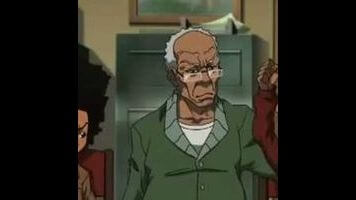Without its creator, the gratifyingly tasteless Boondocks no longer tastes like itself

The fourth, final season of The Boondocks, which was made without the participation of series creator and showrunner Aaron McGruder, has one thing going for it that the Dan Harmon-free fourth season of Community didn’t: It’s been so long since new episodes of The Boondocks aired that some viewers may have forgotten what the show used to be like. McGruder, who is working on a new live-action show for Adult Swim called Black Jesus, recently issued a farewell letter to Boondocks fans in which he wrote, “For three seasons I personally navigated this show through the minefields of controversy. It was not perfect. And it definitely was not quick.”
He can say that again. The first season premiered in the fall of 2005, and the third concluded almost three-and-a-half years ago. The series was always erratic, which is a common condition among shows that are dancing through minefields, but at its best it produced some of the sharpest satire on TV—and it was always McGruder’s baby.
Based on a small sampling of upcoming episodes, the new season is a copy of McGruder’s baby made from a printer that needs a fresh ink cartridge. The clear, hard lines of McGruder’s vision and sensibility aren’t the only things that are a little faded. On a show like this, the freshness and relevance of the satirical targets counts for a lot, and three-and-a-half years is a lifetime in popular culture. So it’s not altogether encouraging to tune into the new season and see Robert “Granddad” Freeman (still voiced by the prodigious John Witherspoon) barreling through a desert landscape in an RV while stripped to his underwear and wearing a gas mask. It’s a reference to Breaking Bad, a television program that played out its entire five-year run between the end of The Boondocks’ premiere season and the start of this one.
McGruder’s characters and point of view provide a workable template for other talented writers, and the Breaking Bad parody has some laughs in it. The story involves Granddad having brought the family to the brink of homelessness through his extravagant living and expensive dating regimen—or, as revolutionary-in-training Huey (Regina King) calls it, “Taking bitches out to eat again.” Salvation arrives when it’s discovered that the gelatinous bomb materials Huey has been developing in the garage make an excellent hair product. When Huey objects to the idea of selling people explosives to massage into their scalps, Granddad reasons, “We’ll put a warning label on it. ‘Warning: Flammable.’ Moral dilemma solved!” The story gets out anyway, and soon there are excitable news anchors on TV inveighing against the Freeman’s miracle hair gel, over a headline reading “HAIR RAZING DEVELOPMENT.” The Freemans’ business partner, a sinister hair salon operator, is unfazed. “These bitches would put napalm on their hair if it made it straight,” she says, and points out the inherent defects in some popular rival products: “This here will turn your brain green. This stuff has plutonium. This one here is acid. Just acid!”
The Breaking Bad episode has the benefit of keeping the Freemans front and center. For some reason, Cartoon Network has chosen to lead off the season with an episode centering on the Freemans’ neighbor, wealthy attorney Tom Dubois, and his new client, a Chris Brown-like pop star who’s accused of robbing a liquor store. Restarting the series with an episode like this practically amounts to a warning label itself. For one thing, McGruder already dealt with the subject of the public’s forgiving attitude toward morally reprehensible celebrities in the first-season episode “The Trial Of Robert Kelly.”
Here, the show narrows its focus down to women’s supposedly uncontrollable attraction to bad boys, which it interprets as a longing to be dominated. The singer—who is famous not just for suggestive hits as “Please Me Orally” and “Rub Against My Erection,” but for physically assaulting his ex-girlfriend onstage during the Grammys—explains to the baffled Tom that “a woman would rather be with a guy that beats her to death than one that bores her to death.” It turns out that the singer and his publicity team staged the liquor store robbery as part of their campaign to keep his manufactured bad-boy image alive, which is old Mad magazine “hippies are the real conformists!” stuff. When Aaron McGruder’s instincts play him false, which happens often enough, they usually take him to more original places than this. The show hits rock bottom when Tom angrily tells the singer that he’s starting to wonder if he even really beat his girlfriend. The singer is indignant: “Don’t you ever question whether I beat Christiana. I whupped that bitch’s ass!”
Season four of The Boondocks is a lot like that scene in David Cronenberg’s The Fly in which Jeff Goldblum confirms that he hasn’t yet programmed his teleportation device to fully grasp the intrinsic qualities of flesh. He teleports a steak, and what comes through looks like a steak but tastes synthetic, not quite right. The new Boondocks looks and sounds like the old Boondocks. But only one of them came from the real cow.